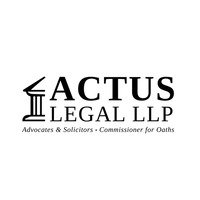Best Criminal Defense Lawyers in Chinatown
Share your needs with us, get contacted by law firms.
Free. Takes 2 min.
List of the best lawyers in Chinatown, Singapore
Singapore Criminal Defense Legal Articles
Browse our 1 legal article about Criminal Defense in Singapore written by expert lawyers.
- Outrage Of Modesty
- Outrage of Modesty?Outrage of modesty appears to be an umbrella term for acts that have violated one’s modesty. Its legal definition as it appears in the Penal Code, however, scopes the acts of ‘outrage of modesty’ more narrowly. In fact, it is usually synonymous to the more commonly known act... Read more →
About Criminal Defense Law in Chinatown, Singapore
Criminal Defense Law in Chinatown, Singapore falls under the wider jurisdiction of Singapore’s criminal legislation. It deals with offenses ranging from minor infractions to severe criminal activities. The Penal Code and the Miscellaneous Offenses Act are among the statutes that govern criminal law here. It's important to note Singapore has a robust legal system characterized by strict enforcement of laws and severe penalties, including capital punishment for serious crimes.
Why You May Need a Lawyer
Legal representation is critical in any criminal case. If you're accused of a crime, a criminal defense lawyer can protect your rights, negotiate plea deals, and argue your case in court if necessary. Even in less severe cases, navigating complex legal procedures, understanding charges, and preparing a defense can be challenging without professional legal help. Furthermore, the severe penalties under Singapore law highlight the importance of sound legal counsel during criminal proceedings.
Local Laws Overview
In addition to the Penal Code, which covers a wide range of offenses from theft to murder, the Miscellaneous Offenses Act regulates public nuisance, harassment, and similar offenses. Penalties vary depending on the severity with fines, imprisonment, and the possibility of corporal punishment in some instances. Notably, drug offenses are treated particularly seriously, and the Misuse of Drugs Act allows for capital punishment in severe cases. Knowledge of these laws and their application is central to effective criminal defense in Chinatown, Singapore.
Frequently Asked Questions
What are my rights if I'm arrested?
If you're arrested, you have the right to counsel. Call a lawyer promptly, or ask to have one appointed for you. You also have the right to remain silent to avoid self-incrimination, but you must still provide personal data such as your name and identification number.
What constitutes theft under Singapore law?
Theft is broadly defined as dishonestly taking any movable property without the consent of its owner. Severity and penalties vary depending on factors such as the value of the stolen goods and the circumstances of the theft.
Does Singapore criminal law apply to foreigners?
Yes, Singapore's criminal laws apply equally to residents and foreigners. Visitors should be especially aware of strict laws relating to drugs, vandalism, and public behavior. Worse still, serious drug offenses can attract capital punishment.
Can I represent myself in court?
While you have the right to self-representation, it's generally discouraged due to the complexity of legal procedures and the severe nature of potential penalties. Sound legal counsel is strongly advised.
What's considered a public nuisance in Singapore?
The Miscellaneous Offenses Act outlines a variety of activities considered a public nuisance, such as interfering with the free passage along any public road or littering. Penalties include a fine, and for repeat offenders, imprisonment.
Additional Resources
The Law Society of Singapore, the State Courts of Singapore, and the Criminal Legal Aid Scheme (CLAS) are all resources to assist with understanding criminal defense law in Singapore. They offer advice, legal aid, and can help you find legal representation if necessary.
Next Steps
If you need legal assistance, move quickly. Contact a reputable criminal defense attorney, a community law center, or the Legal Aid Bureau. If you've been arrested, ask law enforcement officers to contact your attorney immediately. Remember to provide detailed facts of your case to your attorney to ensure appropriate advice and defense are formulated.
Lawzana helps you find the best lawyers and law firms in Chinatown through a curated and pre-screened list of qualified legal professionals. Our platform offers rankings and detailed profiles of attorneys and law firms, allowing you to compare based on practice areas, including Criminal Defense, experience, and client feedback.
Each profile includes a description of the firm's areas of practice, client reviews, team members and partners, year of establishment, spoken languages, office locations, contact information, social media presence, and any published articles or resources. Most firms on our platform speak English and are experienced in both local and international legal matters.
Get a quote from top-rated law firms in Chinatown, Singapore — quickly, securely, and without unnecessary hassle.
Disclaimer:
The information provided on this page is for general informational purposes only and does not constitute legal advice. While we strive to ensure the accuracy and relevance of the content, legal information may change over time, and interpretations of the law can vary. You should always consult with a qualified legal professional for advice specific to your situation.
We disclaim all liability for actions taken or not taken based on the content of this page. If you believe any information is incorrect or outdated, please contact us, and we will review and update it where appropriate.
Browse criminal defense law firms by service in Chinatown, Singapore
Chinatown, Singapore Attorneys in related practice areas.










